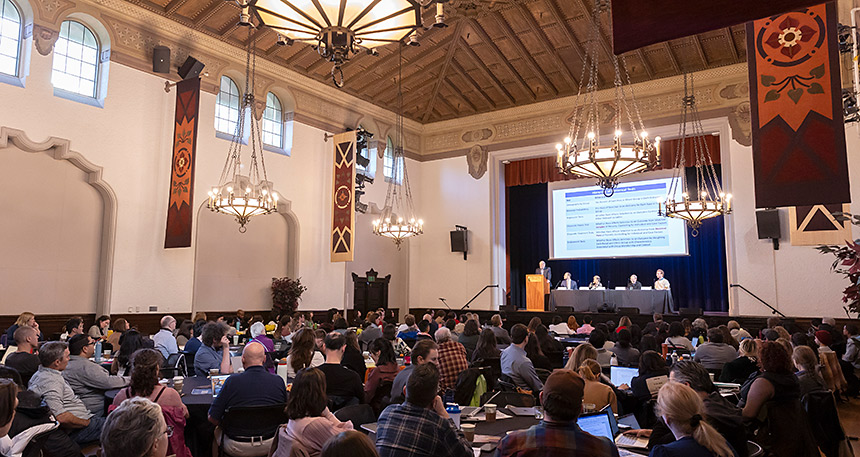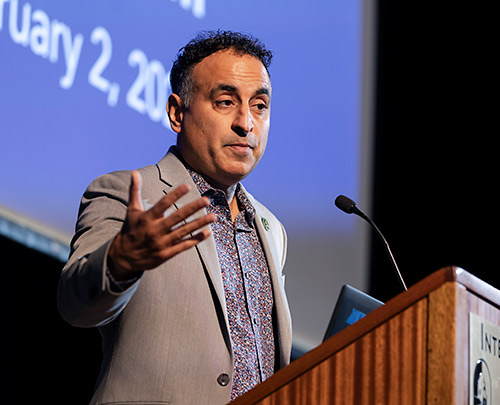
By Andrew Cohen
More than 500 people registered for Berkeley Law’s recent California Racial Justice Act Symposium, which examined the 2020 Act’s early implementation and implications.
Presented by the school’s Criminal Law & Justice Center and Berkeley Journal of Criminal Law, the event welcomed expert lawyers, computer scientists, scholars, government officials, criminal justice nonprofit leaders, students, and others who probed a wide swath of issues. State Assembly member Ash Kalra, who wrote the Racial Justice Act (RJA), gave the keynote address.

The massive turnout signaled the topic’s importance to lawyers across the state, pleasantly stunned event organizers, and showed that the RJA is a white-hot topic in the criminal legal system.
“This is more than triple what we initially anticipated,” said Chesa Boudin, the center’s executive director. “It’s not just the number of people, it’s the diversity. We have representatives from over half the public defender offices in the state, other defense-side lawyers, appellate lawyers, and more. This forum is for people on the front lines of the Racial Justice Act to share information, lessons learned, pitfalls to avoid, strategize informally, and learn from experts in the field.”
The law prohibits bias based on race, ethnicity, or national origin in charges, convictions, and sentences issued in court. It permits a challenge to a criminal conviction if a judge, attorney, law enforcement officer, expert witness, or juror exhibited bias or animus towards the defendant because of their race, ethnicity, or national origin — or used racially discriminatory language during the trial.
Applicable to cases sentenced after Jan. 1, 2021, the law runs counter to the 1987 Supreme Court decision in McClesky v. Kemp, which rejected the use of statistical disparities in applying the death penalty to prove intentional discrimination required for a constitutional violation.
“Racism affects every aspect of the criminal justice system,” Berkeley Law Dean Erwin Chemerinsky said. “That’s why the Racial Justice Act is so important. We’re trying to deal with racism in charging, convictions, and sentencing. But it’s time to assess the act, to better understand it, and think about how to strengthen it.”
Diving into the data
Berkeley Law Professor Colleen Chien led the first panel on a data tool that she helped develop to better identify racial information and disparities across the criminal legal system. Five years ago, she founded the Paper Prisons Initiative to address the gap between eligibility for relief from the criminal justice system and actually gaining that relief.

Moderated by 3L Alex MacLennan, Berkeley Journal of Criminal Law co-editor-in-chief, the panel described how the poor administration of relief measures like the RJA and a lack of data can keep people in prison and stunt their reintegration after release. Chien noted that her work to develop and refine the research tool aims to produce systems and data that empower people working on criminal cases.
“Not all of us are criminal law experts, but we do understand how to work with data and tech, with empirical researchers and software developers, to bring this knowledge to defense lawyers,” she said.
The Paper Prisons team, including Berkeley Law students, showed how the tool breaks down differences among races for different offenses and various stages of the criminal process and differentiates between California’s 58 counties.
2L Bennett Cyphers, who spent four and a half years as a technologist with the Electronic Frontier Foundation before law school, ran through some advanced filtering options such as age, gender, and prior criminal history.
“The more data from public agencies that we’re able to have access to and then incorporate, the better we can fill in some of our current gaps,” he said. “As we’re releasing this tool, we want feedback early and often to improve and refine it.”
Hurdles to clear
After four public defenders discussed the RJA’s role in sussing out implicit and overt bias at the trial level, a panel probed the post-conviction landscape. Appellate specialist Marc Zilversmit highlighted examples of troubling judicial comments and jury instructions, and Ella Baker Center Prison Advocacy Coordinator Morgan Zamora urged steps to apply the act fairly.
“We need to increase accessibility for non-English speakers, including interpreters and self-advocacy resources, in Spanish and other languages,” Zamora said. “There are approximately 75,000 people of color in California Department of Corrections custody, and a large portion is of Latino descent and Spanish speakers. We need to make sure justice is more accessible for them as well.”

Office of the State Public Defender attorney and Berkeley Law alum Lisa Romo ’87 discussed litigating RJA claims and their inherent challenges.
“There’s not enough money; we have defenders who are overwhelmed and not enough staff to process all the requests coming in,” she said. “We desperately need more resources. The legislature just appropriated $2 million just for retroactive RJA claims, which is appreciated, but that’s just a drop in the bucket because so many people need assistance. Between grants for attorneys, paralegals to screen motions and letters from clients, and experts to support their claims, it doesn’t come cheap and it’s time-consuming.”
Despite that hurdle and the challenge of obtaining reliable information in older cases, Romo remains encouraged.
“I’ve never seen so many communities come together the way they are with the Racial Justice Act,” she said. “We have defenders working with amazing community organizations, nonprofits, academics, and statisticians to talk about how to tackle the racism we know is there. We’ve seen it for years. Now we have an incredible opportunity to tell the story of racial discrimination and bias in the criminal legal system. This is not short-term work, but it’s going to have a huge impact I hope on the lives of our individual clients and hopefully also a real systemic impact.”
The road ahead
Subsequent panels examined the prominent role data science will play in the act’s effectiveness, and the structural change it could produce. UC Berkeley Goldman School of Public Policy Professor Mia Bird highlighted how public defenders look for bias in convictions and “upcharging” differences across racial groups and in the severity of sentence length.

“A problem is that the data is highly decentralized,” she said. “There’s little integration across jails, the DA’s office, and courts. It’s not assembled in a way that can be used for research purposes, and may fail to account for differences at earlier stages of the criminal legal process.”
Panelist Alex Carney and alumna Dana Yeo ’21 founded PDQuery, which provides free technical consultations to attorneys representing indigent criminal defendants.
“To do this work successfully requires working differently than how lawyers are used to,” Carney said, alluding to analyzing past cases and precedent. “Instead, this takes engaging in the data in front of us, figuring out the right numbers to look at, and putting a story together.”
Columbia Law School Professor Jeffrey Fagan echoed that sentiment, and the importance of personalizing the figures, asserting that defense lawyers must “humanize and demystify the data” and be able to express it in a way that appeals to natural intuitions about what inequality means.
“One of the greatest things about being a lawyer, particularly if you’re a public defender, is that you continue to learn,” Boudin said. “In so many areas, the Racial Justice Act has put us in a position where we have to learn.”